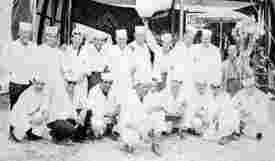No true history of the American Circus would be complete without mentioning the often overlooked concessionaires or "butchers"as they are referred to on circuses. These are the hard working and hard partying, colorful characters that keep circuses on the road.
On a circus the ticket sales pay salaries and operating expenses. It is the circus concessions that provide the profit that keep circuses alive.
Few people knew their true names as many of them went by nick-names such as Pete the Tramp (pictured below), Wacky Mack, Apple Annie, Good Looking Eddie, High Pockets, Camel Rider, Jack the Ripper, Never Worry Murray Etc.
Most circus historians neglect this important segment of the circus industry.
A "butcher"is a person who sells the cotton candy, popcorn, cold drinks, programs, coloring books and novelty items.
The origin of the term "butcher"is not clear, but one story suggest that the first butcher was actually a meat butcher who took a job on the John Robinson Circus during the 1800s. He found that although hard work, selling candy was much more profitable than working as a meat butcher.
The term became common in the late 1800s and early 1900s not only on circuses but it was also used in vaudeville theatres, burlesque houses and aboard passenger trains. Thomas Edison once worked as a candy butcher on the Grand Trunk Railroad trains as a youth.
On circuses the butchers work on commission. There is often extra work butchers must do in order to obtain the "privilege"of selling their products. The term for this extra (unpaid) work is "Chinese", (see our "Circus Lingo Page". |

